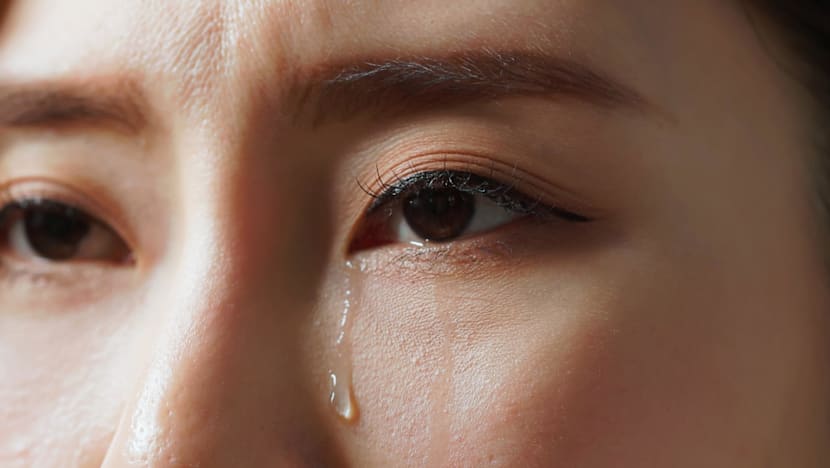Health
Embrace Your Tears: The Importance of Crying for Mental Health

Crying, often dismissed in professional environments, is actually beneficial for mental health. Experts advocate that allowing oneself to cry can lead to emotional release and stress relief. As society often frowns upon visible displays of emotion, many adults suppress their tears, resulting in unprocessed emotions and potential psychological issues.
Dr. Alla Demutska, the clinical director of psychotherapy and counselling at The School of Positive Psychology, emphasizes that crying is a uniquely human experience. Unlike animals, who produce tears primarily for protection, humans cry emotionally, marking significant life moments. As we grow, our reasons for crying evolve from basic needs in infancy to complex emotional experiences linked to relationships and life changes.
Serene Lee, a psychotherapist and founder of ICCT.sg, explains that crying serves as a pressure valve, releasing repressed feelings such as sadness, frustration, or even joy. When we cry, our bodies shed stress hormones like cortisol, which leads to a sense of relaxation and peace afterward. Lee notes, “The emotional pathways in the brain can overlap for both sadness and happiness, so crying becomes an outlet for strong emotions.”
Research shows that by six weeks old, infants cry an average of about 2.25 hours daily, which reduces to around 68 minutes by twelve weeks. As adults, women cry significantly more often than men, averaging between 30 to 64 times yearly compared to men’s five to 17 times. This difference is less about biology and more about societal norms regarding emotional expression.
The perception of crying as a sign of weakness is prevalent, particularly in workplace cultures. Lee points out that women often feel pressure to suppress their emotions to maintain a professional image, while many men are socialized to view crying as a lack of control. This creates a stigma around a natural human response that can be vital for emotional health.
Crying is important for mental well-being, according to Lee, who describes it as “clearing out your emotional closet.” Regular emotional release can lead to a sense of balance and readiness to tackle life’s challenges. Conversely, suppressing tears can result in emotional numbness, irritability, and even physical symptoms like headaches and fatigue.
While crying is a valuable tool for emotional regulation, it is not the only means to process feelings. Dr. Demutska clarifies that some individuals may find other forms of expression, such as physical activity or creative outlets, more effective. The key is recognizing and accepting one’s emotions, regardless of whether they are processed through tears.
Not all crying is healthy, however. Dr. Demutska warns that excessive crying, especially if it disrupts daily life or is accompanied by thoughts of self-harm, can be a sign of deeper psychological issues. Persistent tearfulness or crying without understanding the cause may indicate conditions such as depression or prolonged grief disorder.
The location and timing of tears can also influence their emotional impact. Lee advises that individuals should not feel the need to plan when or where to cry. Instead, allowing emotions to surface naturally is most beneficial. Suitable environments for emotional release can include privacy at home or tranquil natural settings, where the individual feels safe to let go.
In conclusion, while societal norms often discourage tears, embracing this natural response can significantly enhance emotional health. Allowing oneself to cry can lead to healing and a sense of relief, ultimately contributing to a more balanced and fulfilling life.
-

 Lifestyle5 months ago
Lifestyle5 months agoHumanism Camp Engages 250 Youths in Summer Fest 2025
-

 Business5 months ago
Business5 months agoKenvue Dismisses CEO Thibaut Mongon as Strategic Review Advances
-

 Sports5 months ago
Sports5 months agoDe Minaur Triumphs at Washington Open After Thrilling Comeback
-

 World3 months ago
World3 months agoSouth Korea’s Foreign Minister Cho Hyun to Visit China This Week
-

 Sports5 months ago
Sports5 months agoTupou and Daugunu Join First Nations Squad for Lions Clash
-

 Top Stories5 months ago
Top Stories5 months agoColombian Senator Miguel Uribe Shows Signs of Recovery After Attack
-

 World5 months ago
World5 months agoASEAN Gears Up for Historic Joint Meeting of Foreign and Economic Ministers
-

 Health5 months ago
Health5 months agoNew Study Challenges Assumptions About Aging and Inflammation
-

 Business5 months ago
Business5 months agoOil Prices Surge Following New EU Sanctions on Russia
-

 Business3 months ago
Business3 months agoStarling Bank Plans Secondary Share Sale, Targeting $5.4 Billion Valuation
-

 Entertainment5 months ago
Entertainment5 months agoDetaşe-Sabah Violin Ensemble Captivates at Gabala Music Festival
-

 Entertainment5 months ago
Entertainment5 months agoBaku Metro Extends Hours for Justin Timberlake Concert









